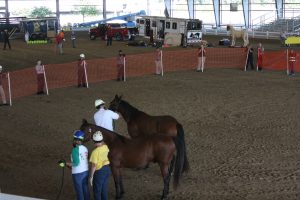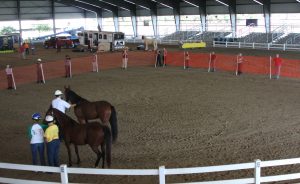HARRINGTON – In the event of an accident, emergency or natural disaster, such as Hurricanes Harvey or Irma, animals of all sizes may need help. That’s why the Division of Public Health Office of Animal Welfare (OAW) held a Technical Large Animal Emergency Rescue (TLAER) course Friday, Sept. 8, through Sunday, Sept. 10, 2017, at the Delaware State Fairgrounds in Harrington. The training was conducted by OAW’s Delaware Animal Response (DAR) team in conjunction with the Delaware State Fire School.

The first-of-its-kind course in Delaware prepared volunteers and emergency responders to rescue large animals from dangerous situations, like what is happening in the aftermath of Hurricanes Harvey and Irma, where livestock, horses and even dolphins are in desperate need of rescue.
“The potential for disasters and emergencies involving large animals and livestock in Delaware is great,” said Delaware Animal Response Coordinator Karen Clark. “We feel it is vital to provide our emergency responders with the training, knowledge, and expertise to safely handle any large animal and livestock emergency situation that can arise.”

Attendees learned about the latest rescue concepts, techniques and equipment with hands-on practice. While the course is designed to concentrate on handling horses during emergency incidents, the skills learned can be applied to assist livestock, exotics and zoo animals. Training sessions included rescues from a barn fire, trench, mud and overturned trailers, and an evening search.
Funding for the TLAER course was provided by a grant from the U.S. Department of Safety and Homeland Security.
The DAR program was established in response to lessons learned from Hurricane Katrina, when many people would not leave home without their pets and many pets had to be left behind by those who did evacuate. It became clear that pets must be included in emergency planning for the safety and welfare of all. Congress then passed the Pets Evacuation and Transportation Standards (PETS) Act, which requires states to take into account the needs of household and service animals before, during, and after an emergency or disaster.
To become a Delaware Animal Response program volunteer, contact Karen Clark at 302-242-3594.
A person who is deaf, hard-of-hearing, deaf-blind or speech-disabled can call the DPH phone number above by using TTY services. Dial 7-1-1 or 800-232-5460 to type your conversation to a relay operator, who reads your conversation to a hearing person at DPH. The relay operator types the hearing person’s spoken words back to the TTY user. To learn more about TTY availability in Delaware, visit http://delawarerelay.com.
Delaware Health and Social Services is committed to improving the quality of the lives of Delaware’s citizens by promoting health and well-being, fostering self-sufficiency, and protecting vulnerable populations. DPH, a division of DHSS, urges Delawareans to make healthier choices with the 5-2-1 Almost None campaign: eat 5 or more fruits and vegetables each day, have no more than 2 hours of recreational screen time each day (includes TV, computer, gaming), get 1 or more hours of physical activity each day, and drink almost no sugary beverages.